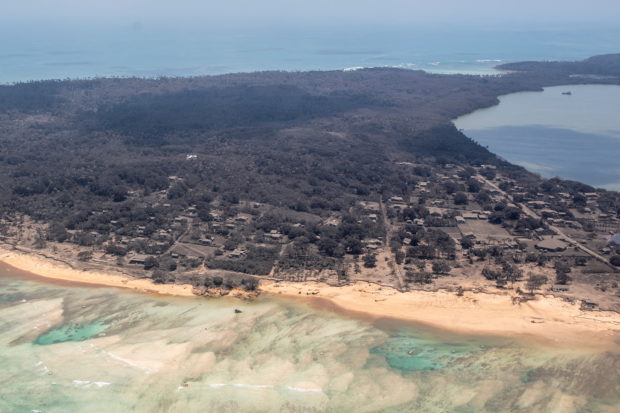
FILE PHOTO: A general view from a New Zealand Defense Force P-3K2 Orion surveillance flight shows heavy ash fall over Nomuka in Tonga after the Pacific island nation was hit by a tsunami triggered by an undersea volcanic eruption January 17, 2022. Picture taken January 17, 2022. New Zealand Defense Force/Handout via REUTERS
The United Nations is preparing for distanced relief operations in Tonga to avoid a COVID-19 outbreak in the Pacific island nation that is reeling under the impact of a volcanic eruption and tsunami, an official said on Wednesday.
All the homes on one of Tonga’s small outer islands have been destroyed and three people have so far been confirmed dead, the government said in its first statement after Saturday’s devastating eruption.
With communications badly hampered by the severing of an undersea cable, information on the scale of the devastation so far has mostly come from reconnaissance aircraft.
Fiji-based United Nations co-ordinator Jonathan Veitch said in a media briefing that the agency will conduct most operations remotely, and may not send personnel to the island.
“We believe that we will be able to send flights with supplies. We’re not sure that we can send flights with personnel and the reason for this is that Tonga has a very strict COVID-free policy,” Veitch said.
Tonga is one of the few countries that is COVID-19 free and an outbreak there would disastrous, he said. The tiny island nation has 90% immunization coverage both in adults and also younger people over the age of 12, Veitch said.
“They’ve been very cautious about opening their borders like many Pacific islands, and that’s because of the history of disease outbreaks in the Pacific which has wiped out societies here.”
The U.N. has 23 people on the ground plus other international NGOs to help with relief efforts, Veitch said.
He said the World Health Organization would start a discussion with the government “in a cautious manner, but we won’t be doing anything to threaten the safety of their protocols and the safety of their population in terms of COVID.”
Clean up underway
The Tongan government has started evacuating stranded residents in some outlying areas. Water supply has been “seriously affected” by volcanic ash and is a major concern, the prime minister’s office said in its statement late on Tuesday.
Ships carrying supplies and relief equipment, including water, have left from ports in Australia and New Zealand but will take at least five more days to reach Tonga’s shores.
Clearing the airport runway of ash is a priority for the government. The archipelago’s main Fua’amotu International Airport was not damaged but the ash was having to be manually removed.
“We thought that it would be operational yesterday, but it hasn’t been fully cleared yet because more ash has been falling,” Veitch said.
Tsunami waves reaching up to 15 meters hit the Ha’apia island group, where Mango is located, and the west coast of Tonga’s main island, Tongatapu, the prime minister’s office said. Residents were being moved to evacuation centers as 56 houses were destroyed or seriously damaged on that coast.
Atata and Mango are between about 50 km and 70 km from the Hunga Tonga-Hunga Ha’apai volcano, which sent tsunami waves across the Pacific Ocean when it erupted with a blast heard 2,300 km (1,430 miles) away in New Zealand.
Australia and New Zealand have promised immediate financial assistance to Tonga.
The U.S. Agency for International Development approved $100,000 in immediate assistance to support people affected by volcanic eruptions and tsunami waves.